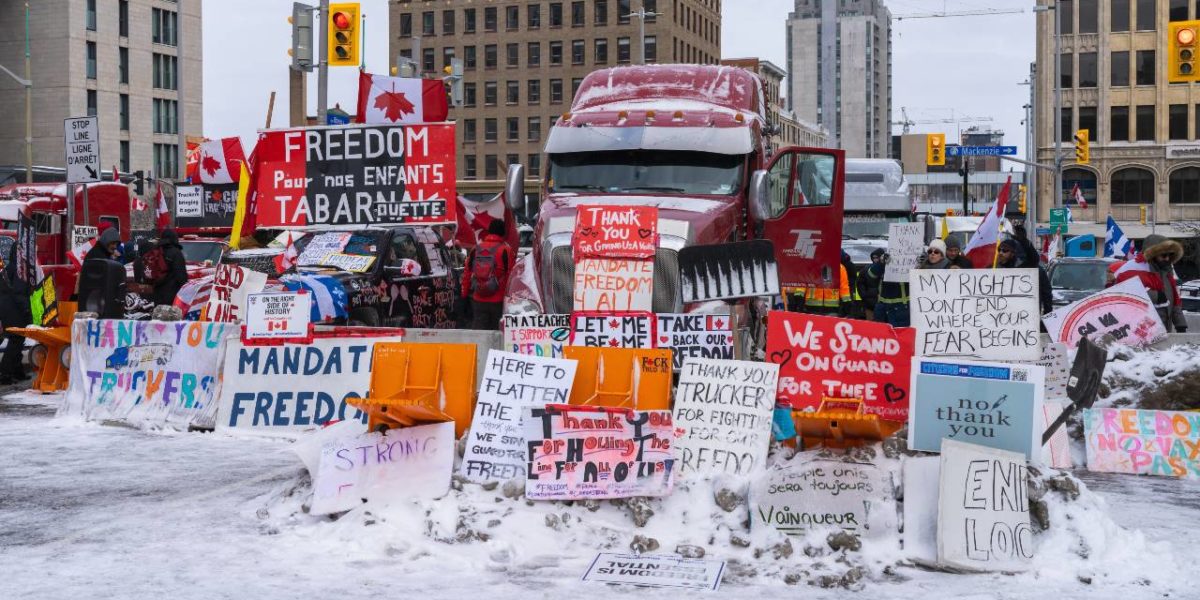Last February, Justice Paul Rouleau came out with his exhaustive report on the Trudeau government’s resort to the Emergencies Act, in 2022, to end the trucker convoy’s occupation of Ottawa.
Rouleau concluded that even if the government’s use of the Act, with all of its extraordinary powers, might not have been entirely legal, it was necessary.
This past Tuesday, Federal Court Judge Richard Mosley reached a mirror-image conclusion.
Mosley ruled that while Liberals’ resort to the emergencies legislation was legitimately motivated, it was not in full conformance with the letter of the law.
The convoy-ers (some of whom currently face criminal charges) and their Conservative allies are gloating over Mosley’s judgment.
If they read the full text of the ruling, however, those who instigated, participated in, and egged on the occupation will find little to cheer about.
This case came about when several groups – notably the much-respected, 79-year-old Canadian Civil Liberties Association (CCLA) and the younger, right-of-centre Canadian Constitution Foundation (CCF) – sought judicial review of the Trudeau government’s declaration of a Public Order Emergency on Valentine’s Day (February 14) 2022.
The groups argued that the federal government did not need emergency powers to deal with the occupying truckers and their allies. They said the relevant authorities (mostly municipal and provincial) had all the powers they required under the normal criminal law.
The judge agreed on that point, with some reservations.
Mosley did recognize that the federal government faced a dilemma in 2022, because there had been a breakdown in policing.
That was in part the fault of the inept and confused Ottawa police leadership; but that local breakdown was exacerbated by an Ontario government which had abdicated its responsibility.
In Canada, provinces have over-all constitutional responsibility for most policing within their borders.
In his 2023 report, Justice Rouleau went into some detail on that sorry part of the story.
He noted that Ontario took an inconsistent and passive aggressive approach to the convoy crisis.
When blockaders threatened international trade at the Windsor-Detroit border Premier Doug Ford’s government acted.
But when convoy-ers entirely disrupted the economy and daily life for thousands of people in downtown Ottawa, they folded their arms and would not even participate in strategy meetings with the city and federal governments.
Tellingly, Ontario premier Doug Ford and his then-solicitor general Sylvia Jones refused to testify before Justice Rouleau.
Freedom of assembly does not equal freedom to harass and disrupt
In the federal court case, the CCLA and the CCF also argued that the federal government’s use of the Emergencies Act deprived some people of certain rights guaranteed by the Canadian Charter of Rights and Freedoms, notably the right to freedom of assembly.
On that crucial point, Mosley did not agree. He said, in effect, that trucks are not people. Freedom of assembly ends when it becomes so disruptive it denies others the freedom to carry on their lives.
Here is how Mosley characterized the actions of the convoy protesters in Ottawa:
“The protest became a blockade of downtown government, business and residential districts accompanied by incessant noise from truck horns, train type whistles, late night street parties, fireworks and constant megaphone amplified hollers of ‘freedom’. Fumes from the exhausts of diesel and gasoline engines permeated the air and seeped into neighbouring premises. Containers of fuel were being brought in constantly to keep the vehicles running and to provide heat. There were reported incidents of harassment, minor assaults and intimidation. This created intolerable conditions for many residents and workers in the district.”
Conservative leader Pierre Poilievre, et. al., should take note. There is no ringing endorsement of the convoy there.
Indeed, Mosley added this even more disturbing detail:
“Visible symbols of hate were seen to be held or worn by protestors in media photographs of the occupation.”
He described “demonstrators wearing yellow Star of David emblems featuring the words ‘non vaxx’ in comparison to the symbols victims of the Holocaust were forced to wear. News articles reported protestors with flags featuring swastikas, and signs bearing the Nazi SS symbol, as well as Confederate flags.”
And the federal court judge also noted the “effort by some of those involved in the protest to interfere with the democratic process and undermine the government.”
Here, he was referring to the draft memorandum protest organizers distributed, in which they “proposed to form a joint committee to assume government functions in return for which the convoy would cease its occupation of Ottawa.”
Judge would have made same decision as Trudeau
In the end, Mosley ruled against the government on fairly narrow grounds, one of which was that the country-wide application of the Emergencies Act Declaration was, perhaps, too broad.
“The scope of the Declaration and the measures could have been limited to Ontario which faced the most intransigent situation,” he wrote.
The most telling part of Mosley’s decision is his expression of sympathy for the federal government and, unusual for a judge, his confession that had he been in government at the time he might have been inclined to support invoking the Emergencies Act.
“At the outset of these proceedings,” Mosley wrote, “I was leaning to the view that the decision to invoke the Act was reasonable. I considered the events that occurred in Ottawa and other locations in January and February 2022 went beyond legitimate protest and reflected an unacceptable breakdown of public order.”
In the end, Mosley admitted that “in conducting judicial review of [the decision to use the Emergencies Act], I am revisiting that time with the benefit of hindsight and a more extensive record of the facts and law than that which was before the government of Canada.”
Enough said.
The lesson of both Mosley’s judgment and the Rouleau report is that the 1988 Emergencies Act is inadequate to current conditions.
The government has pledged to do the work to update that out-of-date legislation.
It must now get on with that task.



